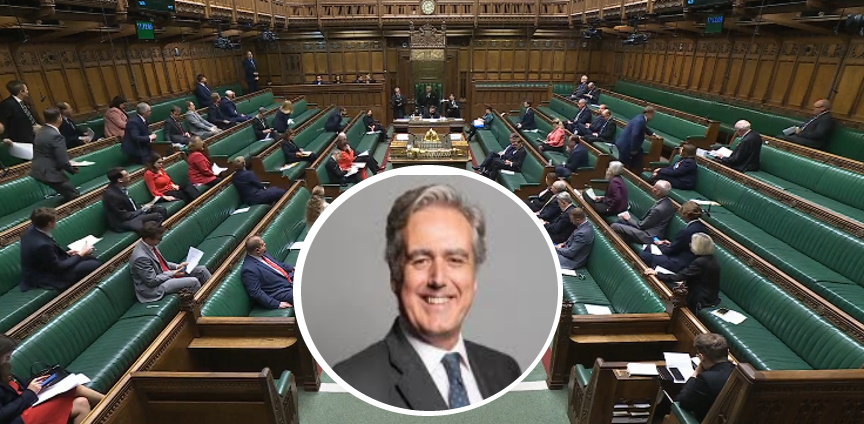WYRE Forest MP Mark Garnier voted in favour of the Assisted Dying Bill which made it through to the next stage in Parliament today.
The Terminally Ill Adults (End of Life) Bill 2024-25 went before the House of Commons after being brought by Kim Leadbetter MP as a Private Members’ Bill and made it through by 330 votes to 275.
The bill includes a substantial safeguarding criteria before a person is permitted to end their life, including assessments by two doctors, at least seven days apart. It will also be up to the High Court to decide if the requirements are met.
On X, Mr Garnier said having lost his mum to cancer, he supported the bill because he believed in the importance of dignity in those final moments.
“This is the first of many stages which consider all implications, and the final bill may look very different.”
Mr Garnier said previously of the bill: “The proposed Bill has a couple of important safeguards.
“Those seeking its provision must have less than 6 months to live and must be of sound mind.
“Two doctors and a judge need to sign it off and the individual concerned needs to be the person who actually administers the final act.
“If passed, the bill will go to committee stage, where its previsions are debated line by line.
“Following that is report stage, where it can be amended.
“Then it needs to pass third reading, the final stage in the House of Commons, before heading off for a similar process in the House of Lords.
“If anything is changed, it comes back to the Commons for more debate. It is only after everyone has collectively agreed on everything that it finally gets Royal Assent and becomes an Act of Parliament.
“I have written about this in the past.
“I will be supporting the bill on Friday. The death of my mother from pancreatic cancer, has convinced me of the necessity of this.
“Indeed, I have had many, many emails from people who have seen loved ones die slow and, sometimes, painful deaths.
“But I have spent far more time listening to those who oppose this. I have wanted to be certain that my experience and opinion is not flawed.
“Whilst I have listened very carefully to many, many people, including religious leaders and representatives of various groups concerned about this, I still find myself convinced that dignity in those final moments is something worth striving for.”
Background to the bill – how we got to this stage
The legislation going through UK Parliament is officially known as: ‘The Terminally Ill Adults (End of Life) Bill 2024-25’.
Its long title is: ‘A Bill to allow adults who are terminally ill, subject to safeguards, to be assisted to end their own life; and for connected purposes’.
Since the announcement was made that the bill, brought by Kim Leadbetter MP, would be coming to Parliament, there has been much debate – both in the media and in households up and down the country.
Decisions on ending lives would ‘allow adults who are terminally ill, subject to safeguards and protections, to request and be provided with assistance to end their own life’.
Friday’s sitting will be the bill’s second reading and the government will ‘remain neutral’ on the bill, enabling MPs to have a free vote, according to their own view on whether it should go to the next stage.
As the law stands
While suicide and attempted suicide are not criminal offences, it is an offence (in England and Wales) for a person to intentionally encourage or assist the suicide (or attempted suicide) of another – under the 1961 Suicide Act.
The aims of the bill
The bill is aimed at enabling adults – aged 18 and over – who have mental capacity, are terminally ill and are in the last six months of their life, to ask for a doctor to assist them in ending their life.
The safeguards and process
A substantial amount of criteria must be met by the applicant before they would be allowed to bring an end to their life – they must live in either England or Wales and each request must be assessed by two doctors, at least seven days apart.
The person must also have a ‘clear, settled and informed wish to end their own life’ and had reached the decision voluntarily, without coercion or pressure. If both doctors state, independently of one another, that the eligibility criteria have been met, the person may apply to the High Court for approval of their request.
If the High Court decided the applicant met the requirements of the bill, there would be a 14-day reflection period (this would be shortened to 48 hours if death is imminent).
After this time, the applicant may make a second declaration to request assistance to end their life. If the doctor continues to be satisfied that the person meets the eligibility criteria, a life-ending ‘approved substance’, to be self-administered, would be prescribed.
A person who provides assistance to another in accordance with the bill would not face any criminal (or civil) liability, and the Suicide Act 1961 would be amended accordingly. The section 2 offence would continue to apply to assistance falling outside the framework in the bill.
So where do you stand?
We want to know what your view is on the ‘The Terminally Ill Adults (End of Life) Bill 2024-25’. Would you vote for, against or are you unsure? Let us know your views by voting below.
Further reading
To read more on The Terminally Ill Adults (End of Life) Bill 2024-25, click here.












